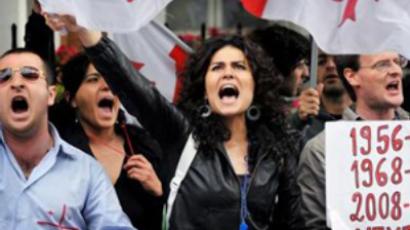ROAR: South Ossetia mulls over non-use of force pact with Georgia

The authorities in the former Georgian republic need a non-aggression accord rather than a new Tbilisi strategy as international intermediaries try to cement the Geneva talks on the North Caucasus.
The Geneva discussion co-chairmen, led by EU envoy Pierre Morel, arrived in South Ossetia on July 12. The delegation, which also included representatives of the Organization for Security and Cooperation in Europe (OSCE), the UN and the Office of the UN High Commissioner for Refugees (UNHCR) met with refugees and South Ossetian officials.
After the talks in Tskhinval, South Ossetia's envoy for post-conflict settlement Boris Chochiyev said the republic had proposed adjustments to the Geneva discussion procedures to make them more efficient.
South Ossetia will consider a draft non-use of force accord submitted by the Geneva discussion co-chairmen. “Neither South Ossetia, nor Abkhazia are contemplating withdrawal from the discussions at the current stage,” Chochiyev was quoted by Interfax as saying.
Earlier Tskhinval supported Abkhazia’s decision to suspend participation in the Geneva talks on security in the North Caucasus. Tbilisi said Abkhazia made the decision under “pressure from Moscow.” South Ossetia was ready to participate in the next round of talks only if a new draft non-use of force agreement is submitted.
Starting from the sixth round Tskhinval said the discussions were deadlocked. The twelfth round may be postponed, Chochiyev said. He stressed security and refugees were two of the most important issues, but the fresh draft did not respond to the republic’s proposals on refugees.
“We wish to fulfill the agreements reached by the Medvedev-Sarkozy accord,” the official said. He added that the US considered it unnecessary to draft a legally binding document, which would prevent the use of force.
Tskhinval, however, is insisting on signing a non-aggression pact that “will prevent the use of force by Georgia, the aggressor, against South Ossetia.”
Chochiyev also stressed that the chairmanship of representatives of the UN, EU and OSCE at the talks were “illegal.” Earlier in July, Moscow insisted on broadening interactive opportunities for all the parties to the Geneva talks.
Russia also supports proposals to conclude a legally binding agreement on non-use of force between Georgia, Abkhazia and South Ossetia. This position was reiterated during a meeting between Russian Deputy Foreign Minister Grigory Karasin, UN representative for Georgia Antti Turunen and Special Representative of the OSCE Chairman-in-Office Bolat Nurgaliyev in Moscow on July 12.
Meanwhile, the OSCE Parliamentary Assembly has passed a resolution on the return of refugees to South Ossetia and Abkhazia, Georgia’s Rustavi 2 TV channel said. According to the source, the document “calls on the parties involved to cooperate in finding ways to facilitate an early voluntary return of refugees and internally displaced persons from both sides to their homes of origin.”
Politicians and analysts, however, doubt that progress could be achieved soon in the talks. Russia’s NATO envoy Dmitry Rogozin even suggested in this regard that Georgia would benefit if it recognizes the independence of South Ossetia and Abkhazia.
“While the problems surrounding South Ossetia and Abkhazia remain unresolved (and they will not be resolved until Georgia recognizes the republics’ independence) Georgia’s road to NATO is closed,” RIA Novosti quoted Rogozin as saying.
Moscow recognized the independence of the two republics after the 2008 conflict in the North Caucasus. They have been also recognized as independent states by Nicaragua, Venezuela and the island state of Nauru.
On July 12, Abkhaz President Sergey Bagapsh received credentials from Venezuelan Ambassador in Sukhum Hugo Jose Garcia Hernandez. The ambassador also represents his country in Russia. “Hopefully, relations between Abkhazia and Venezuela will be as strong as relations between Russia and Abkhazia,” Bagapsh said.
Meanwhile, Tbilisi hopes to “regain” the two breakaway republics, and has recently developed a new “strategy” aimed at improving relations with them. Analysts doubt that this policy will be successful.
“Georgia should conduct a direct dialogue with Abkhazia and South Ossetia,” said State Duma deputy and political scientist Sergey Markov. He described Georgia’s “strategy” as “a useless scrap of paper,” adding that a dialogue between Tbilisi, Tskhinval and Sukhum will start “sooner or later.”
Tbilisi should not wait for someone to “sell” Abkhazians and Ossetians to it, Markov said. “The sooner the dialogue starts, the better for Georgia,” he told South Ossetian Osinform news agency.
The talks should primarily concern the economic sphere, the deputy stressed. “It is difficult to speak about the republics’ status now,” he said. But the Georgian leadership “is only imitating readiness for the talks” and does not have any strategy, Markov said.
Tbilisi has put forward initiatives about establishing economic ties with the two republics. “But how can one speak about the economic integration of these regions when the law on occupied territories exists?” asked Sergey Markedonov of the Institute of Political and Military Analysis.
He also described as “not serious” a recent proposal by Georgian President Mikhail Saakashvili to the Russian leadership regarding a dialogue between Moscow and Tbilisi.
At the same time, there is an illusion in Russia that if Saakashvili “abandons power, a new stage in bilateral relations will begin,” the analyst said, speaking at the Washington-based Center for Strategic and International Studies.
“The issues of Abkhazia and South Ossetia will be on the agenda again whoever leads Georgia,” he noted. However, the Caucasus, which was at the center of international relations two years ago, has now ceased to be a central issue, he added.
Sergey Borisov,
Russian Opinion and Analysis Review, RT














